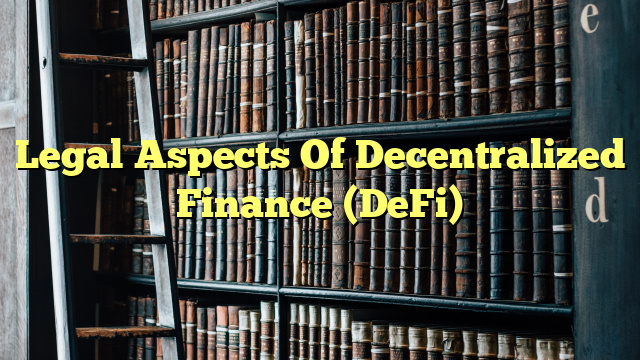Table of Contents
Legal Issues of DeFi
Decentralized Finance (DeFi) presents unique legal challenges due to its decentralized nature and the involvement of multiple parties. Some of the key legal issues include:
- Regulatory Compliance: DeFi platforms often operate across multiple jurisdictions, making it challenging to comply with various regulatory requirements.
- Smart Contract Risks: Smart contracts, which power DeFi applications, are not immune to coding errors or vulnerabilities. These issues can lead to financial losses or legal disputes.
- Money Laundering and Terrorism Financing: DeFi platforms can be exploited for illicit activities, such as money laundering or financing terrorism, due to the pseudonymous nature of transactions.
- Consumer Protection: DeFi lacks traditional intermediaries, making it difficult to provide consumer protection mechanisms, such as dispute resolution or recourse for fraudulent activities.
Aspects of DeFi
Decentralized Finance encompasses various aspects that differentiate it from traditional financial systems:
- Openness: DeFi platforms are open to anyone with an internet connection, enabling greater financial inclusion.
- Permissionless: Users can access and interact with DeFi applications without requiring permission from any central authority.
- Interoperability: DeFi protocols can be integrated and combined to create new financial products and services.
- Transparency: Transactions and smart contracts on DeFi platforms are typically recorded on a public blockchain, providing transparency and auditability.
Major Limitations of Decentralized Finance
While DeFi offers numerous advantages, it also has some limitations:
- Scalability: DeFi applications built on public blockchains face scalability challenges, leading to slower transaction speeds and higher fees.
- Security Risks: Smart contracts and decentralized applications are susceptible to hacks, bugs, and vulnerabilities, potentially resulting in significant financial losses.
- User Experience: DeFi platforms can be complex and challenging for non-technical users to navigate, limiting mainstream adoption.
- Regulatory Uncertainty: The regulatory landscape for DeFi is still evolving, creating uncertainty and potential legal risks for participants.
Regulation of Decentralized Finance
Decentralized Finance operates in a regulatory gray area, as it challenges traditional financial systems and regulatory frameworks. While some jurisdictions have started taking steps to regulate certain aspects of DeFi, the overall regulatory landscape remains fragmented and uncertain.
Regulatory bodies are grappling with how to apply existing regulations to DeFi, especially when it comes to issues like investor protection, anti-money laundering, and financial stability. As the industry continues to grow, it is expected that regulators will increase their focus on DeFi and develop new frameworks to address its unique challenges.
Legal Aspects of Decentralized Finance (DeFi) presents unique challenges due to its decentralized nature and involvement of multiple parties. Some of the key legal issues include regulatory compliance, smart contract risks, money laundering and terrorism financing, and consumer protection. On the other hand, DeFi offers aspects such as openness, permissionless access, interoperability, and transparency. However, it also has limitations in terms of scalability, security risks, user experience, and regulatory uncertainty. The regulation of DeFi is still evolving, with regulatory bodies trying to navigate the challenges posed by this innovative technology.

